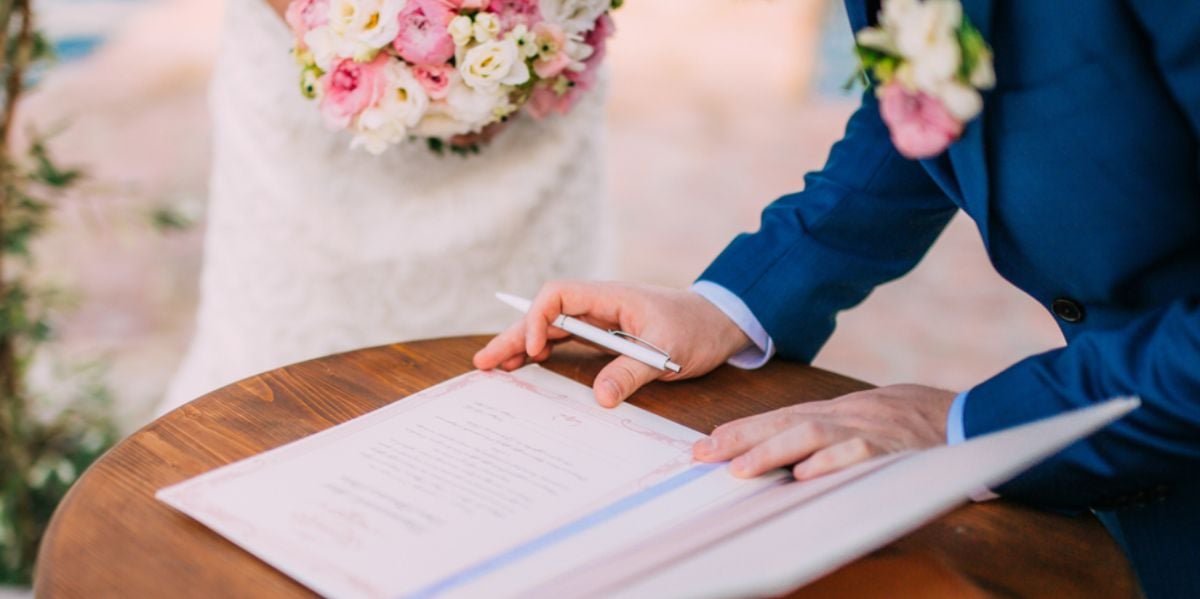
Getting married in the Philippines provides a backdrop of immense beauty through stunning beaches, tropical scenery, unspoiled environments in the provinces, or the luxury of 5-star salubrious hotels in cities like Manila. Getting married in the Philippines can add even more ‘magic' to that magical day. This article delves into the requirements for foreign couples marrying in the Philippines and foreign & Filipino couples marrying in the Philippines.

Before we get carried away, first things first; preparing and applying for the marriage license.
Applying for a marriage license in the Philippines
A marriage license must be filled out by both applicants – bride and groom – and is a mandatory legal requirement to get the ball rolling. Once completed, then a visit to the local town hall/municipal hall (LGU) is necessary to submit and pay the marriage license fee. Like in other countries, the marriage license is an integral part of the whole process, and it is no different in the Philippines. You may be required to attend a course/ seminar, and if so, it is recommended, as you'll need the attendance certificate to get your marriage license.
The normal timescale to receive the marriage license 1is 0 days. Note that the marriage license is only valid for four months from the date of issuance, so plan your wedding ceremony accordingly.
Essential documents for your marriage license in the Philippines
The first mandatory document the expat/foreigner will need to provide is their original or certified true copy of the birth certificate from the country they were born, along with their passport proving their nationality.
The next essential is to provide a ‘CENOMAR'; a “Certificate of Legal Capacity to Contract Marriage”. A CENOMAR is usually obtained from the expat/ foreigner's country of origin. The CENOMAR should state that the applicant is not already married and nothing prevents them from marrying their chosen partner.
Two recent passport-sized photos that are 1” x 1” or 2" x 2" sized are also needed. The photo must be clear with a plain white background.
If your future spouse is from the Philippines, they will also need to provide the following documents:
- PSA (Philippines Statistics Authority) Birth Certificate;
- PSA Certificate of No Marriage/ CENOMAR;
- community tax certificate;
- death certificate if widowed.
In cases where an applicant has been married before, then an original or certified true copy of the divorce certificate., a court order of annulment, or a death certificate of the deceased spouse is also required.
When an applicant is aged between 18 to 21, they must have written parental consent. Marriage applicants aged between 22 to 25 must receive ‘parental advice' (also a document in writing). It is, of course, strictly forbidden to marry anyone under the age of 18 under Philippine law.
Types of weddings in the Philippines
Choosing a civil or church wedding will dictate your next step and the correct documents pertinent to each option.
Civil weddings
Civil weddings in the Philippines are slightly more straightforward than church weddings, but church wedding documents are more easily acquired. The above-mentioned documents are the requirements for a civil wedding in the Philippines. The civil wedding would normally take place in a courthouse or municipal hall.
Church weddings
To get married in a church in the Philippines, you will need to attend several events:
- Participate in a canonical interview
- Undergo a pre-Nuptial Investigation of the Priest
- Attend a pre-marriage seminar
Additional documents required for a church wedding in the Philippines
Church weddings (religious ceremonies) will require extra documents for foreigners before tying the knot in the Philippines. In a country with a strong religious background, couples who prefer to have a church wedding ceremony are commonplace. The Philippines boasts various churches and parishes all around the country officiating weddings. Along with the requirements we've already listed above, here are some of the additional requirements for church weddings:
- Canonical Interview
- Certificate Attendance to a Pre-Marriage Seminar
- Certificate of Freedom to Marry
In addition, the applicants will need to declare any marriage bans, provide the certificate of freedom to marry, Baptismal Certificate and Confirmation Certificate of both applicants, a permit to Marry and a ‘Dispensation of Approval' or /Permit 'to Marry' from their local Parish Priest and finally a list of principal sponsors and entourage members. Please note you will have an annulment clearance if you have been married in a Catholic Church before.
If you are an expat who is not a Catholic, then there will be approvals and red tape to go through with the Arch Diocesan Chancery Office and provide an approval letter from your particular faith leader and a Legal Capacity to be Married certificate issued by your respective embassy.
Same-sex marriage/union in the Philippines
The Philippines does not legally recognize same-sex unions, either in the form of marriage or civil union. The family Code of the Philippines only recognizes marriages between "a man and a woman". The 1987 Constitution itself does not mention the legality of same-sex unions or has explicit restrictions on marriage that would bare same-sex partners to enter into such an arrangement.
Marriage tradition and customs in the Philippines
Filipino weddings have certain unique traditions and customs. Candle lighting, blessing of the coin, a veiling, tying of the nuptial chord and throwing of rice grains (like confetti) are just a few.
A uniquely Filipino custom is the money dance, where the newlyweds dance and the guests pin cash on their suit and dress as a symbol of financial success to come!
As expected, post- wedding will be the wedding reception. The big difference, especially in the Provinces, is that the wedding reception is normally open to all the local residents and ‘baboy'; spit-roasted pig plus many other delicacies should be available.
How long can a married foreigner stay in the Philippines?
The visa (13a) will allow the applicant to stay in the Philippines indefinitely, provided the conditions of the visa are maintained, i.e., a valid marriage with a Filipino citizen, among others. The process usually takes 2 – 3 months from the complete submission of the documentary requirements. The 13a Permanent marriage visa is valid unless you divorce or your spouse passes away.
To apply for the (13a) marriage visa, also known as the Alien Spouse Visa, you must visit the local Bureau of Immigration Office. At the BI office, you should declare your marriage certificate, be married to a Filipino (a) national, and prove you have the financial means to support yourself and your partner.
Annulments and getting divorced in the Philippines
Not to dampen the mood, but in the unfortunate event of a permanent break-up, the next step is not as straightforward as in Western countries.
As divorce is actually outlawed in the Philippines, the expat can only apply for a divorce from abroad, and if successful, both parties can be allowed to marry again.
There are 5 causes that will allow for an application for a civil or religious annulment:
- lack of parental consent
- insanity/psychological incapacity
- fraud
- force, intimidation, or undue influence
- impotence or sexually transmissible diseases.
The annulment would be processed through a Philippine court; therefore, hiring a lawyer is essential. You will then proceed as follows:
- Get a psychological evaluation; if the grounds for annulment is psychological incapacity to be married;
- File the petition for annulment with the proper court;
- Attend the pre-trial conference and the actual trial;
- Receive the judge's decision;
- Finally, settle the distribution of the assets.
In conclusion, marriage in the Philippines, like any country, carries many documents and procedures with it. A Catholic church wedding, with its pomp and splendor, adds even more bureaucracy but has the benefit of getting married through a faith-based ceremony if desired.
The Filipino romantic dream of getting married is one of the highlights of their life and their family life, and it should be remembered how important this big day is if you are marrying a local.
We do our best to provide accurate and up to date information. However, if you have noticed any inaccuracies in this article, please let us know in the comments section below.








